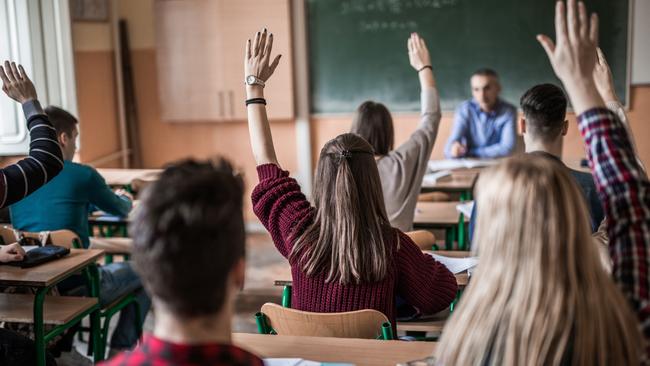
Naturally the conformist ideologues who govern publishing don’t want those impulses to run free. However, a lot of parents and teachers might say: “But if only the children could just read!”
As a teacher before I began column writing (a doddle in comparison) it was plain to me before I left teaching in the late 1990s that our education system was in decline. There seemed to be a lot of running free in the classroom.
Education is the bottom line for any productive society. Glenn Fahey, an education researcher from the Centre for Independent Studies, quoting a new Productivity Commission report earlier this year, said: “Despite two rounds of Gonski reviews, two rounds of National Innovation and Science Agendas, several reviews of teacher training, Building and Digital Education Revolutions, among many more, little progress has been made in raising the bar, levelling the bar or even ensuring more students are able to meet basic standards in Australia.
“Most damning is the report’s conclusion that most who fall behind early in school never go on to beat minimum expectations in literacy and numeracy.”
True, money is not the answer. We know poorly designed curriculums lacking rigour have a lot to do with the sloppy and illogical thinking that discourages hard knowledge-based learning. We know a more instructional approach, rather than the fashionable exploratory approach, works for better outcomes and we know that in the classroom and whole school environment discipline is vital.
Sadly, Australian classrooms are right near the bottom of the OECD scale that measures classroom behaviour. That data shows that 15-year-old students in disruptive classrooms are around nine months behind in their learning than those in more orderly classrooms. Classroom disruption is far more common when classes lack explicit teaching and attentional control.
Fahey, who is preparing a submission on the issue of classroom disruption and disorder for the Senate for next week, says the disciplinary climate index measured by the OECD has shown a consistent and significant decline in Australia, with more class teaching time lost coinciding not only with declining student achievement but also lower levels of new teachers’ classroom readiness, especially in classroom management. Add the problem of connectivity through social media in an age when a three-year-old can use an iPad. No wonder teachers persist only with a small group of kids who want to learn.
A lot of this decline in behaviour has been blamed on the education crisis during the pandemic. However, the data proves that this decline preceded Covid-19.
It is difficult to see any way out of this malaise. Frustration is palpable in many schools. Children’s mental state is poor and, according to a survey by the Australian Catholic University, principals are leaving because of increased violence from children and parents.
So, are parents less respectful of teachers and has student behaviour worsened over time partly because of this? How much of this malaise is caused by a deeper problem: lack of parental control that in turn is affecting children’s attitudes and behaviour? While it may be true that parents are more willing to challenge teachers, available evidence suggests parents generally hold teachers in high regard and value their work.
In a CIS survey of parents’ perspectives during the pandemic, parents reported having a higher degree of confidence in teachers than they did before the pandemic. In fact, many parents place too much burden on teachers. Many behavioural problems begin at home, but speak to any teacher, particularly in the primary years, and they will tell you parents expect an awful lot from teachers. One primary teacher has told me parents frequently asked for advice on a children’s general behaviour at home, with questions like “How do I make them go to bed?”
Young children are little universes of chaos, but modern versions of teaching practice assume children are natural learners. They are curious and they like to learn simple social and language skills, but higher-order skills are a different matter – that is hard and requires good behaviour, attention and built-in social skills.
Most of the teachers and teacher educators who believe children are naturals who will just do what the teachers want come from an elite social environment. One wonders if they have ever met any normal anarchic children. The word discipline has bad connotations for new teachers. But discipline can mean self-discipline. Using terms for parents like sanctions and consequences are less confronting.
Small children are impetuous. They must have scaffolded boundaries. It is not just a series of telling them what not to do but telling them what to do. They have to know what the expectations are.
The ideology of behaviour management is part of teaching style. The markers of a well-run classroom, like a family, are routine and clear ideas, and then it must be systemised. A lot of the order of the classroom is system. It is just in the back of kids’ minds so they don’t have to ask. Doing this is not, as some would say, oppressing kids; it is freeing them to acquire discipline necessary for real learning and academic success.




Lately there has been a lot of news about the bowdlerisation of children’s literature. Whether JK Rowling or Roald Dahl or even the now maligned Dr Seuss, good literature appeals to children’s imaginatively anarchic impulses.